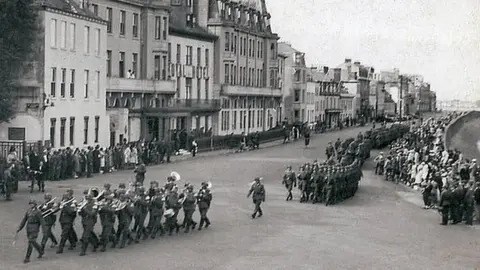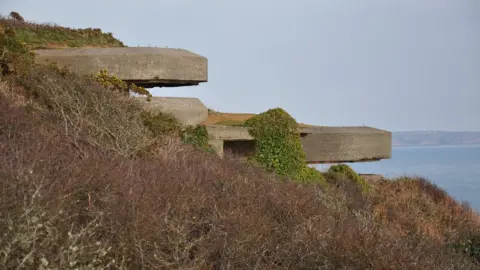Addressing German Occupation injustices 'being explored'
 BBC
BBCInjustices handed down by Guernsey's court while the island was occupied by German forces in World War Two are being re-examined.
Guernsey's Royal Court was effectively still a British court during this time.
Last year the Privy Council refused an appeal for three former policemen deported to Europe for stealing food to give to hungry civilians.
While legal routes may be exhausted senior politicians are exploring alternatives.
The Policy and Resources Committee (P&R) said: "Historic legal matters dating back to this period are complex and some issues have already been considered by the bailiwick's highest appeal court, so finding a resolution is not straightforward."
It said the committee aimed to bring proposals before the States later this year.
The three policemen whose family pursued the appeal were part of a group of 17 who ended up before the courts in Guernsey - both civilian and the German military courts.

Following the appeal result Historian Dr Paul Sanders said: "The British civilian court in 1942 acted like a kangaroo court in the worst dictatorship."
He said the men were told by the Guernsey authorities to plead guilty so the Germans would let them also be tried in the local court, where any conviction "would count for nothing after the war".
Sixteen of the policemen were sent to prisons and forced labour camps.
Herbert Smith died in prison and many of the others suffered debilitating diseases and had life-changing injuries, but because of their convictions from the island's court were treated as criminals and denied their pensions.
Deputy Jonathan Le Tocq, a P&R member, said: "We must find a way to recognise publicly, cases where islanders who were put through the judicial system during the occupation faced injustice in process, sentencing or both.
"Many people today consider that they were wrongly punished and their reputations wrongly tarnished for the rest of their lives and some were caused physical harm.
"It doesn't matter that decades have passed: for those families, and for many other islanders, the passage of time does not undo the wrongs that took place and if there is still an opportunity to right them in some way, we should make every effort to do that."

Follow BBC Guernsey on Twitter and Facebook. Send your story ideas to [email protected].
